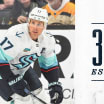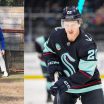The Seattle Kraken announced this week all net proceeds from the sales of its inaugural "Release the Kraken" apparel and gear line were donated to three local nonprofits working tirelessly to provide critical support to deserving young people: YouthCare, Community Passageways and Urban League of Metropolitan Seattle.
"Whatever challenges and inconveniences we all face as a result of COVID -19 are experienced a hundred-fold by our community's more vulnerable populations," says Mari Horita, Kraken vice president of community engagement and social impact. "In particular the health and economic impacts have disproportionately affected our Black, Indigenous and People of Color communities, and as we planned our launch, we wanted to find a way to leverage that opportunity to provide some relief."
To highlight the work of the three nonprofits, we published stories this week on each organization: Tuesday: YouthCare; Wednesday: Urban League of Metropolitan Seattle; and Friday: Community Passageways.
'Higher Expectations'
Community Passageways CEO and co-founder Dominique Davis leverages 'resources and opportunities' to transform the life paths of young people facing felony charges. Here's how we can help
Community Passageways & Seattle Kraken
The bigger the challenge, the bigger and better the prospects for life-changing outcomes. That's one way to surmise why Dominique Davis upped his commitment to disenfranchised Black youth in 2017 when he started the nonprofit Community Passageways as a "felony diversion" organization.
"I knew it put me in position to help kids dealing with high-end felonies, gun charges, drive-by shootings, burglary," says Davis, CEO and co-founder of Community Passageways, the nonprofit he has started in the Seattle neighborhoods where he grew up as both a prominent football player and drug dealer. "My main vision is to deal with at-risk youth other organizations and even systems could not deal with, kids considered too far down the road, some people might say 'throwaway kids,' gone in the streets with gang activities, criminal activities, drugs."
In the first year of its existence, Community Passageways was referred more than 80 Black youth with felony charges facing at least 112 total years of prison offered as the minimum by prosecutors. Davis and his small staff managed to divert all but 4.5 years of prison, keeping most all of the participants in the community. Those sorts of life-changing data sets continue and even includes by Davis' count some 20 men who now work for Community Passageways after being prison for long sentences. Davis lives what he speaks.
"It's all about resources and opportunities," says Davis during a recent visit to the Seattle Kraken Team Store in South Lake Union with six young men engaged with a full-time healing program with Community Passageways. "The opportunities we need are internships, apprenticeships, full-time employment, job training facilities and people opening up to hiring these young men despite what happened at 14 years old."
The young men accompanying Davis to the store were surprised and clearly delighted with a store credit to buy some gear. Several decided to stock up on warmer sweatshirts and jackets with colder temperatures ahead, including one smiling young man picking both styles of the Kraken toque. More than a couple selected stuffed toys for younger kids in their lives.
During a discussion between the young men and Kraken CEO Tod Leiweke, Davis interjected the cases of some of those in a semi-circle: A 19-year-old who has been in and out of the prison system since nine years old ("in for every birthday and holiday, only 22 months total not in the system"); two program participants whom Davis had recently discovered were sleeping in a car but still arriving on time for classes and sessions with Dion Schell, director of education ("we put them up at a hotel") and another young man who "jumped in [Davis'] car when I picked him and the first thing he said was 'I like my job!").
"We can change lives with resources and opportunities," says Davis. "I know. I was one of those kids. "Resources and opportunities are the key components to stopping violence, gang activity, drug dealing. I know. I was one of those kids."
Davis says a typical path to crime occurs when "barriers are put in the way and young people become survival-minded," doing whatever it takes to stay alive and make money. Young people feel "boxed in" with "no hope, no future," says Davis.
Resources are part of the remedy for any of us who want to help and support: "Money does help," says Davis. "We pay stipends to these young people to go through the programs. We don't want them to go through the healing process and then have to figure out how to eat the next day or buy shoes. We make sure they have money in their pockets so their basic needs are met.
Along with job training and career-path opportunities, Davis says local professionals and trade workers willing to host Community Passageways participants to discuss their work activities is a huge area for potential resources. He explains that his nonprofit is building a new training facility and he brought along some of his young people to a recent meeting with the architects designing the project: "The architects showed us some cool stuff and a couple of our young people, say, 'hey, I think I'm interested in trying that.' Exposure creates higher expectations."
When Davis or his colleague Schell talk, the word "healing" comes up a lot. It's a first step and, as Schell explains, leads to his program students to think about decisions they made in the past, why they made them, what trauma or adversity they faced. Schell's curriculum is focused on getting his students to become critical thinkers about their histories and future lives. The intent is to equip participants with the knowledge to discover and follow a new path. Schell says college professors have remarked to him "your courses are harder than the ones I teach."
The results of the program are evident during the sit-down with Leiweke at the team store. Though the young men know the Kraken CEO held the same job with the Seahawks and hired Pete Carroll as coach, the queries are intentional: "What's your biggest unfinished goal?" and "What traits helped you to succeed and get where you are?"
When Davis decided to change his life some 20 years ago, he decided becoming a football coach was his plumb line to connecting with youth. It helped that people in the community knew his football stardom.
"I started with football, then track and basketball," says Davis. "We started winning championships in football. Some friends and I started about talking about what programs we could start to help youth. It helped that I was already connected to a lot of families. As an organization, we get referrals from prosecutors, defense attorneys, probation officers, sometimes judges and lots of referrals from the community and the youth we work with. They want us to help their brothers, cousins, friends."
While Davis, Schell and other staffers and the young men no doubt enjoyed the dinner, shopping spree and connecting with Leiweke, the visit broke up so Davis and Schell could get home and prepared for the weekend trip on the Community Passageways docket: They were taking 27 young people to Leavenworth for some fun, including zip-lining and horseback riding.
"But the key component is we will be holding peacemaking sessions and healing circles," says Davis. "We will have men sitting young kings to talk what they have been through. There will be tears and laughter. Our curriculum will give them the skills to come back to the community and talk to their gang peers to talk about a truce. We will pay [the program participants] as community ambassadors to push a truce on social media platforms to their home boys and home girls. We are asking for eight weeks of no shooting. That gives us time for our outreach team to talk with different sets and bring them into the same space."
Davis says the first meeting among the 27 community ambassadors required two months to get everyone in the same room, where they showed up with bulletproof vests and guns: "Within a week, a few people had already set a truce. Two weeks later, everyone was laughing and realizing they had more in common than differences. Why are we killing each other? Why not unite?"


















